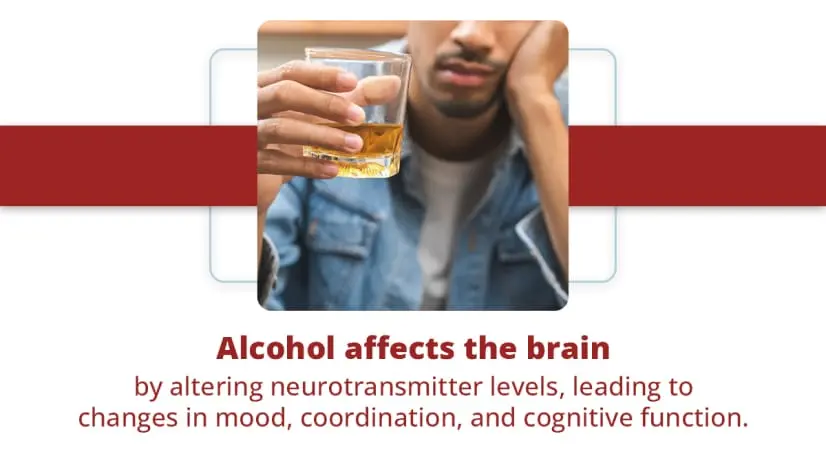
How Does Alcohol Affect Your Brain?
Clinically Reviewed by:
Alcohol has a direct impact on the brain when ingested. Once you take a sip, alcohol swiftly enters the bloodstream, making its way to the brain, resulting in various effects.
In this article, we will examine the short-term and long-term effects of alcohol on the brain. Recognizing the impact of alcohol on the brain is essential for making sound decisions about its consumption. Keep reading to learn more.

Key Takeaways
Alcohol directly impacts the brain upon consumption. Here’s what this article covers:
- Alcohol impacts the brain by quickly entering the bloodstream upon consumption, affecting neurotransmitters and the CNS.
- Alcohol has various short-term and long-term effects on the brain, highlighting the importance of moderation.
- There are many things you can do to mitigate the effects of alcohol.
Take control of your journey to recovery from alcoholism by contacting Indiana Center for Recovery at (844) 650-0064.
Short-term Effects of Alcohol Use On the Brain
Alcohol has various short-term effects on the brain. Here are some common ones:
Impaired Judgment and Loss of Coordination
Alcohol affects the central nervous system (CNS), leading to impaired judgment and coordination. This can result in a decreased ability to make sound decisions and perform tasks that require fine motor skills.
Slowed Reaction Time
Alcohol slows down the transmission of signals between the brain and the body, leading to a slower reaction time. This can amplify the risk of accidents and injuries.
Memory Impairment
Alcohol can disrupt the formation of new memories and impair recall. This may result in gaps in memory, commonly referred to as “blackouts.”
Reduced Inhibitions
Alcohol tends to lower inhibitions, leading to behaviors that a person might not engage in when sober. This can contribute to risky behaviors and poor decision-making.
Mood Changes
Alcohol can influence mood and emotions. Initially, it may produce feelings of relaxation and euphoria, but excessive consumption of alcohol can lead to irritability, aggression, or emotional instability.
Slurred Speech
Being a CNS depressant, alcohol slows down neural processes. This can result in slurred speech and difficulty articulating thoughts.
Interference with REM Sleep
While alcohol may initially help people fall asleep, it disrupts the later stages of the sleep cycle, particularly REM (rapid eye movement) sleep. This can result in poorer sleep quality and contribute to feelings of fatigue the next day.
Remember, individual responses to alcohol can vary, and excessive alcohol intake can lead to more severe short-term side effects, including alcohol poisoning, respiratory depression, and a risk of accidents or injuries.
Long-Term Effects of Alcohol Use On the Brain
Long-term alcohol use can have profound and detrimental effects on the brain. Here are the common effects:
Brain Shrinkage
Excessive drinking can shrink brain tissue, particularly in areas of the brain associated with memory and learning, such as the hippocampus. This can result in cognitive deficits and memory problems.
Wernicke-Korsakoff Syndrome
Regular heavy drinking can lead to a thiamine deficiency, which may result in Wernicke-Korsakoff Syndrome. This disorder is characterized by severe memory impairment, confusion, and coordination difficulties.
Cerebellar Atrophy
The cerebellum, responsible for coordination and motor control, can undergo atrophy due to chronic alcohol use. This can lead to balance problems, tremors, and difficulty with fine motor skills.
Neurotransmitter Imbalance
Alcohol affects neurotransmitter levels in the brain, including dopamine and serotonin. Prolonged alcohol exposure can disrupt the balance of these neurotransmitters, contributing to mood disorders and an increased risk of depression.
Increased Risk of Neurological Disorders
Heavy alcohol use is related to a higher risk of neurological disorders such as dementia, including Alzheimer’s disease. The risk is particularly elevated in individuals with a history of heavy drinking.
Impaired Cognitive Function
Long-term alcohol abuse can result in persistent cognitive impairment, affecting attention, reasoning, and problem-solving abilities.
Alcohol-Related Brain Damage (ARBD)
This term encompasses a range of conditions associated with chronic alcohol misuse, including cognitive impairment, memory loss, and difficulties with abstract thinking.
Alcohol-Induced Psychosis
Some individuals may develop alcohol-induced psychosis, characterized by hallucinations, delusions, and other psychotic symptoms.
Increased Vulnerability to Stroke
Chronic alcohol consumption increases your risk of stroke, as it can contribute to high blood pressure and interfere with blood clotting mechanisms.
Alcohol Dependence and Withdrawal
Long-term use of alcohol causes physical and psychological dependence. Withdrawal symptoms, such as tremors, anxiety, and seizures, can occur when an individual attempts to stop or reduce alcohol intake.
Remember, the severity of these effects can vary among individuals, and not everyone who consumes alcoholic drinks will experience the same consequences.
How To Mitigate Alcohol’s Adverse Effects On The Brain
Alcohol’s impact on brain health is significant, but there are practical steps individuals can take to minimize its adverse effects. Here are the steps:
Moderation and Responsible Drinking
The first step in safeguarding your brain from the adverse effects of alcohol is moderate drinking. Consuming alcohol responsibly by setting limits and being mindful of intake helps minimize the immediate impact on cognitive functions and promotes overall well-being.
Healthy Lifestyle Choices
Supporting your brain’s resilience involves making healthy lifestyle choices. Adequate sleep, a balanced diet rich in nutrients, and regular exercise contribute to optimal brain function. These choices not only counteract the adverse effects of alcohol but also enhance cognitive abilities and emotional well-being.
Support Systems
Having a solid support system is crucial. Surrounding yourself with friends and family members who encourage responsible drinking and share similar values can positively influence your choices and provide a buffer against potential negative consequences.
Mindfulness and Stress Management
Mindfulness practices and stress management techniques play a pivotal role in minimizing the impact of alcohol on the brain. By adopting meditation and relaxation exercises, individuals can mitigate stressors that may contribute to excessive alcohol consumption.
Professional Help
In severe cases where alcohol consumption becomes problematic, seeking professional help is essential. Consultation with healthcare providers or addiction specialists can provide personalized strategies for reducing or eliminating alcohol intake, ensuring a healthier path forward.
Remember, individual responses to alcohol can vary, and these strategies may not be one-size-fits-all. It’s vital to tailor your approach based on your own needs and circumstances.
Frequently Asked Questions (FAQ)
Yes, the brain can heal after quitting drinking. With abstinence, neural pathways can regenerate, cognitive function may improve, and, over time, the overall health of the brain can be restored.
Alcohol can negatively impact mental health by contributing to mental health problems like depression and anxiety. It disrupts neurotransmitter balance, affecting mood regulation and exacerbating existing mental health conditions.
Use of alcohol for a long period is associated with an increased risk of dementia, such as Wernicke-Korsakoff syndrome. Moderate alcohol consumption is crucial to minimize this mental health risk.
While exercise has various health benefits, it cannot fully reverse alcohol damage. However, regular physical activity can contribute to overall well-being, potentially supporting recovery and mitigating some adverse effects of alcohol.






 100% Confidential
100% Confidential